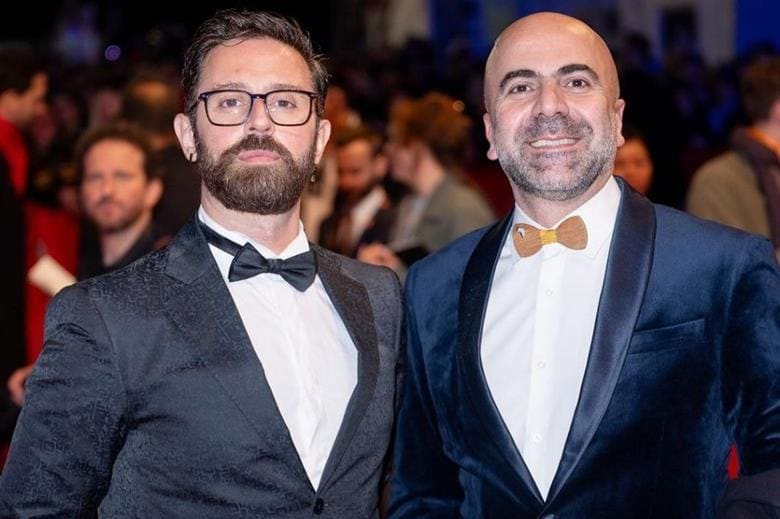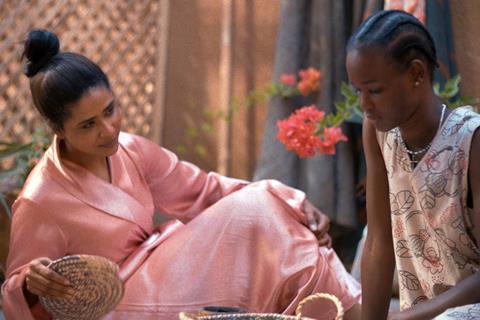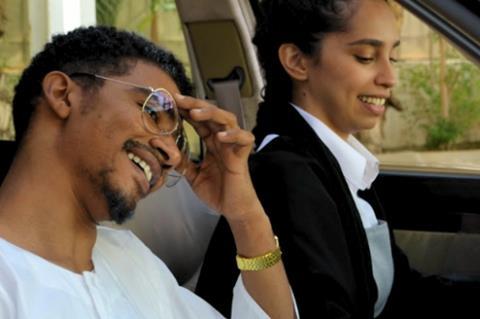Arab studio MAD Solutions looks back on 15 years and readies its next chapter
After 15 years in business, Arab entertainment studio MAD Solutions is entering its next phase.
By Michael Rosser 6 Dec 2024

It has been 15 years since Alaa Karkouti and Maher Diab launched Cairo-based entertainment studio MAD Solutions. Back in 2010, the company focused solely on marketing with just five people on staff. Now, the outfit has five thriving divisions covering film distribution, sales, talent and production. It has a team of more than 70 across the Middle East and major plans to expand further in 2025.
It is also behind some of the biggest commercial and critical successes to come out of the region over the past decade and has been instrumental in promoting Arab filmmaking around the world.
“We saw a massive gap in the market and just connected the dots,” recalls Karkouti, who was a film journalist when he met Diab, who worked as a magazine art director. “There was zero marketing budget for anything related to film throughout the Arab world. People thought we were crazy or idiots for committing to something they believed couldn’t make any money.”
Initial titles in 2010 included Ahmad Abdalla’s Microphone, the first arthouse film produced by Mohamed Hefzy’s now highly acclaimed Film Clinic, commercial Egyptian feature An Ideal Family by Akram Farid, and Mohammed Hushki’s Transit Cities, the first film produced by Rula Nasser (Inshallah A Boy, Hajjan).
During what Karkouti admits were “a tough first few years”, the company launched MAD Distribution to release Arab films throughout the region, and MAD Content, which initially provided much-needed Arabic subtitles for all its releases across the Middle East and North Africa.
Some of its early acquisitions included Yahya Alabdallah’s The Last Friday, which in 2011 was the first ever Jordanian film selected to play the Berlinale, and Ahd Kamel’s short Sanctity, which marked the first Saudi film to screen at the German festival in 2013.
But the turning point for the company was Theeb, which won best director for UK-born Jordanian filmmaker Naji Abu Nowar when it premiered in Venice’s Horizons sidebar in 2014. It went on to win best debut at the Baftas and secured an Oscar nomination.
“With Theeb, we felt there was something special,” says Karkouti. “It broke records for a non-Egyptian festival title when it was released across the Arab world. It marked a massive change because previously we needed to educate the cinemas and media that weren’t used to dealing with a film without stars or a hot topic. Nobody would even think about looking at those films.
“Theeb was rereleased in cinemas following the Oscar nomination and bought by MBC for free-to-air broadcast, neither of which had happened before for this kind of film,” he continues. “More people became interested in non-Egyptian films and festival titles. It was a true breakthrough.”
The company moved into talent management in 2015 with the launch of MAD Celebrity. “Nobody was really doing it,” says Karkouti of the move. “It was seriously zero. Again, it was by default as we spotted this gap in the Arab entertainment world.”
Led by MAD Solutions managing partner and executive director Kareem Samy, the outfit now represents around 70 talents including Egyptian superstar Yousra, Jordanian producer and actress Saba Mubarak, Syrian actress Kinda Alloush, and Saudi filmmaker and actress Fatima AlBanawi.
MAD also operates the Arab Cinema Center (ACC), itself celebrating its 10th anniversary this year, which the company launched to promote Arab cinema outside of MENA. Based in Berlin, the non-profit organisation stages panel discussions at markets including Cannes and Berlin while also hosting an umbrella stand. ACC also operates the Critics Awards for Arab Films, which launched in 2017 and features a voting pool of around 200 international film critics. Plans are afoot to include African films in future editions.
World domination
It was at Cannes in May that the company launched its latest venture, MAD World, a global sales agency dedicated to Arab cinema. Based in Dubai, the outfit is led by Karkouti and Colin Brown, a longtime collaborator and managing partner at MAD Solutions and former editor in- chief of Screen International.

Among its library of around 130 titles are Mohamed Kordofani’s Goodbye Julia, the first Sudanese feature to play at Cannes in 2023, which made more than $700,000 when released across the Arab world and sold to more than 20 countries — most recently China, 18 months after its debut. Further titles include Rani Massalha’s The Return Of The Prodigal Son, an Egypt-Tunisia-France coproduction that won the top project prize at the Red Sea Souk last year; female- empowerment drama Thank You For Banking With Us from Palestinian filmmaker Laila Abbas; and The Last Exorcist: Into Darkness from Saudi writer/ director Asim Altokhais, a horror film based on his own comic book set in 1890 Saudi Arabia.
“With MAD World, we will acquire more Arab films to reach a point where there is a stable level of distribution and sales worldwide so that it’s not just about a couple of exceptional titles,” says Karkouti. “We aim to achieve this in the next two or three years.”
The challenge, he continues, is in the lack of a dependable pipeline for content due to crises and conflicts throughout the region. “There is no stable industry structure in any Arab country,” says the executive. “Many filmmakers achieve success with their first films but never manage to make a second. That’s the result of an unhealthy environment.
“Goodbye Julia was a hot title and there were suddenly endless projects from Sudan. But they can’t shoot there anymore because of the civil war, which has stopped the advancement of Sudanese cinema. It’s the same in Lebanon. At a certain point, cinema provided a major income of revenues but not anymore because of their economic crisis.”
Karkouti adds: “There is not an environment in the Arab world to sustain the production of diverse titles or open ideas without the interference of the censorship.”
The ongoing issue of censorship was felt recently by The Last Miracle, an Egyptian drama directed by Abdelwahab Shawky and handled by MAD Solutions, which was pulled as the opening title of El Gouna Film Festival at the 11th hour after not securing screening approval from Egypt’s Central Authority for the Censorship of Works of Art.
“We’re getting many requests from festivals and hopefully the censorship part will be solved soon,” says Karkouti. “Unfortunately, censorship has been a nightmare for decades. It’s not about logic. You just have to adapt. It’s about religion, sex and politics. It’s really unpredictable.”
Jeddah bound
Red Sea International Film Festival (RSIFF) will mark the end of another busy year for the company, which most recently had six films selected in the official selection of Marrakech International Film Festival and four projects in its industry programme Atlas Workshops.

At RSIFF, MAD Solutions handles features including My Driver And I, coming full circle with Saudi director Ahd after handling her Berlinale 2013 short Sanctity, and Ala Eddine Slim’s Agora, a Tunisian film that premiered at Locarno. For the fourth consecutive year, the company will award one upcoming project at Red Sea Souk with $50,000 for worldwide distribution rights.
The Arab Cinema Center will also give two in-kind awards for a Saudi and Arab project to participate in the 2025 Rotterdam Lab, while MAD Celebrity will also host a private VIP dinner for its talent with high-end fashion company Dior.
Looking ahead, Karkouti says there are plans to open a Saudi branch in the second half of 2025, focusing on talent management, film development and distribution. He also wants the company to move more into production.
“As co-producer, we would like to work on Arab films from the very beginning,” says Karkouti. “When I say ‘Arab films’, they don’t need to be purely Arab. For example, Jonathan Millet’s Ghost Trail, which was the opening film of Critics’ Week at Cannes [this year], is a Syrian story with a French director and screenwriter. That’s what we want to push more. Merging different industries together and [having them] work together somehow.”
This story originally appeared on KFTV's sister site Screen
Latest news & features
Promote your services with KFTV
Choose from three profile types - Basic, Silver and Gold
Create ProfileWe offer a range of display advertising opportunities.
Learn More